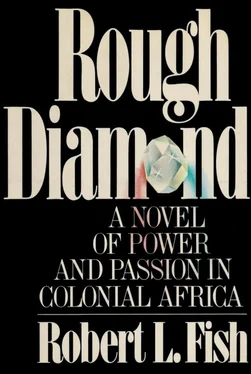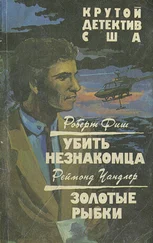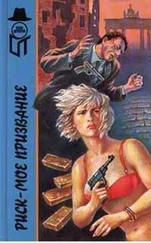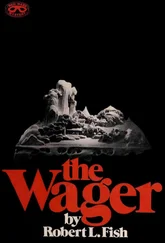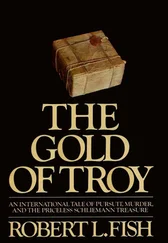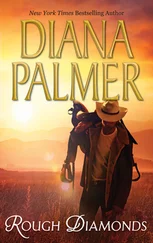He paused a moment, as if suddenly realizing he wasn’t in command, and then went on in a quieter tone of voice.
“My suggestion, Captain Jameson, would be to have us on our way. We’ve nothing to gain by wasting time here.” He looked at Major Thompson with no attempt to hide his contempt. “It may take some people two days to ride here from Jo’burg, but we can be at Mrs. Varley’s Hotel by dawn, and in Jo’burg by nightfall, full bellies and all.”
“And what about sleep?” Lieutenant White asked a trifle sarcastically. He disliked Luckner intensely, especially after the incident of the hot coffee and the Kaffir’s death; besides, second in command should have fallen to him and not to some ex-sailor.
“All that sleep will do for the men is make them wake up hungrier,” Luckner said a bit contemptuously. “A good night’s quick march will take their minds from their bellies. And if we can stay awake, they can stay awake!”
There were several moments of silence; then Lieutenant Willoughby spoke up. He sounded worried. “What about the Boers we’ve had riding on both our flanks ever since the border?”
Luckner looked at him evenly. “What about them? Have they attacked? They haven’t even sniped at us, other than one or two overanxious youngsters, and they haven’t come within a mile of hitting anything, the poor blind bastards! They’re simply curious as to what we’re up to, and by the time they find out, it’ll be too late for them, the silly sods.” He turned back to Jameson. “What about it, Captain? Sit here and look at each other all night, or be in Jo’burg tomorrow night with one of Mrs. Varley’s stews beneath our belts, and the citizens cheering their bloody heads off?”
Jameson sighed. He was going over all the alternatives in his mind. What Luckner said made sense. The longer they delayed, the further the men would suffer hunger, and they wouldn’t be getting any closer to their objective. And Jameson was quite convinced that the mere entry of his forces into Johannesburg would stimulate the Reform Committee, make them get off their silly arses and get cracking on their revolution. The people would make them, if nothing else did, once he and his forces entered the city.
The Boers on his flanks bothered him not at all. To begin with they were few, and the few he had seen through his field glasses appeared to be, as Luckner had said, youngsters. As Willoughby had said, they had ridden their horses on either side of his column since they had crossed the border, but as Luckner had pointed out, there had been no attack, and the sniping had been sporadic and so erratic as to almost make the Boers’ claim to marksmanship laughable. It seemed fairly obvious that the Boer forces were too weak to do anything but observe their movements and wonder what they were about. As Luckner had also said, the Boers were merely curious. And should their curiosity get out of hand, the fact was he had over four hundred men at his command, all trained and armed, and besides, he had eight Maxims and three machine guns, weapons the Boers had probably never seen or heard of in their lives, and whose devastating firepower the Boers could not even imagine. Besides, as Major Thompson had said himself, most of them were probably celebrating Nagmaal in one church square or another throughout the region, and it was only their kids who were riding his flanks.
Still, damn Wolff, anyway! Had the caches of food and the fresh horses been available at the places they were supposed to be available, none of these problems would have arisen, minor though they were. Jameson looked up, making up his mind.
“We go on. Now,” he said quietly.
“Good-o!” Luckner said, pleased. “I’ll have one of the men skin up a pole and tap into the wires. We’ll telegraph Mrs. Varley to expect five hundred hungry troopers for food at dawn!” He came to his feet, prepared to have the telegraph sent and to get the men on their feet and then on their horses, and equally prepared to handle any arguments about the orders he gave the men. Willoughby and White came to their feet more slowly, brushing the dirt from the seat of their uniform jodhpurs.
Captain Jameson looked at Major Thompson. “And what about you?”
“I’ll ride with you,” the major said bravely, “if you can furnish me with a fresh mount.”
“You’ll have to ask Dr. Wolff,” Jameson said expressionlessly. “If I could furnish anyone with a fresh mount, it would be me.” And he stood up.
They came upon the swampy ground just outside of Krugersdorp, just as the morning sun was breaking over the low ridge that separated them from the town. In silhouette they could see Boers strung out along the crest of the ridge, most probably those who had trailed them and who had somehow gotten ahead of them in the night through superior knowledge of the area. Their horses were no longer in sight, but the men themselves could be easily seen, standing almost at rest, their rifles in their hands, watching the column approach. Jameson raised his hand to bring his column to a halt. His advance scouts had already reported the Boers apparently finally seemed ready for a stand to prevent them from advancing any farther. Jameson smiled faintly at this presumption on the part of the enemy, and spoke over his shoulder.
“The Maxims and the machine guns,” he called out. “I want them to shell that ridge clear. The Boers have been asking for a battle ever since we crossed the border. Well, let’s give it to them!”
The eight two-man-operated Maxims and the three single-man-operated machine guns were quickly unloaded and set up; the troops assigned to them fell to their knees, their eyes blurred with sleeplessness, and aimed their weapons in the general direction of the ridge crest. Upon orders they commenced their barrage, the rapid stuttering of the guns making the horses shy, the gunners weaving the muzzles of the guns back and forth across the ridge. Bodies there seemed to be flung to the ground; a few minutes of the rapid fire and the defenders had all been scattered, some lying in deathlike attitudes, others tossed like mealsacks back behind the ridge. Jameson attempted to keep track of the effectiveness of the barrage through his field glasses, but the enemy had had the sun at his back, and the reflection of the low rays in Jameson’s glasses made any true assessment of the situation impossible. The captain waved for the deadly barrage to cease and called for his scouts. They rode up sleepily, saluted, and awaited their orders, biting back yawns, while their weary horses trembled under them.
“Let’s get up there and see how many of them are left,” Jameson said curtly.
“Sor!” said the lead scout, an Irishman and a sergeant, saluting, and wheeled his horse, followed by the others.
The scouts splashed through the swampy ground before the ridge and then rode their tired mounts slowly toward the top, taking precautions not to present a broad profile to be fired at, keeping their heads low behind the ears of their mounts. But to their surprise there was no attempt to attack them, and the reason for this soon became clear. Ahead of them, on the crest of the ridge, there appeared to be no sign of life. In the distance they could see a few men fleeing on horseback, but ahead of them the carnage seemed complete. There seemed to be several hundred of the bodies sprawled there, their rifles flung at arm’s length, their twisted corpses in all the grotesque forms and shapes of unexpected death. The sergeant motioned his men to remain where they were while he rode forward a bit, his mount stepping daintily among several of the most advanced bodies; then he turned and led his men somberly down the ridge, walking the horses slowly through the swampy ground.
“The few what escaped, sor,” the sergeant reported, “are runnin’ fer they lives. But the rest,” he said, still amazed at the accuracy of the barrage, which could only be accounted for by the stupidity of the Boers standing there to be cut down like bloody idiots, “all look deader’n hell, if you’ll pardon me, sor.”
Читать дальше
